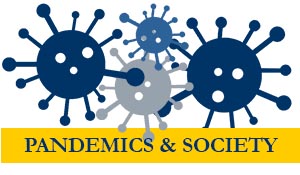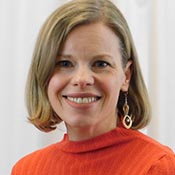WATCH NOW
DOWNLOAD PRESENTATION SLIDES
 The History of Pandemics and Impact on Society – A Series
The History of Pandemics and Impact on Society – A Series
How have pandemics impacted our society? How do we understand pandemics and study them?
The emergence of COVID-19 brings the world to its latest historic moment at the hands of an invisible enemy. In this revealing series, Marquette faculty explore the intersection of humans and disease and how that dynamic has transformed the way people live, work and coexist. By examining historic pandemics and what has been learned over hundreds of years about the link between disease and the human experience, faculty throughout the series will offer new perspectives that prompt us all to reflect on the current circumstances – the 2020 pandemic that has fundamentally changed human existence throughout the world.
SESSION 3: RECORDED ON WEDNESDAY, NOVEMBER 18, 2020
COVID-19 and Economic Inequality in the U.S.
Presented by Dr. Amber Wichowsky, Associate Professor of Political Science, Director of Marquette Democracy Lab, Marquette University Klingler College of Arts & Sciences
In our third webinar of the series, there will be a discussion of how inequality has been exacerbated during the COVID-19 pandemic. Americans’ support for economic redistribution has remained quite stable over the last several decades, even as the gap between the very rich and the rest continues to grow. The pandemic, however, has laid bare the intersecting inequalities among class, gender, and race that put some Americans at greater risk of illness and death and more vulnerable to the economic fallout from the pandemic. This talk will explore how Americans’ concerns about economic inequality, preferences for social safety net programs, and attitudes about work and deservingness have shifted since the outbreak of COVID-19 in the United States.
 Amber Wichowsky is Associate Professor in the Department of Political Science and Director of the Marquette Democracy Lab. Her research explores the intersections between politics and inequality, including class biases in turnout, money in electoral campaigns, and how public policy affects societal inequalities. She is also an occasional source for media coverage of electoral politics, including CNN, NPR, Fox News and several local news outlets. Her book, The Economic Other: Inequality in the American Political Imagination (joint with Meghan Condon, Loyola University Chicago) examines how Americans use social comparisons to make sense of income inequality and how such frames of reference affect attitudes about redistribution and feelings of political power (University of Chicago Press 2020). Amber's other publications include articles on voter turnout, welfare policy, campaign finance reform, legislative representation, presidential primaries, and an award-winning article on the civic implications of public policy evaluation. Amber and her Marquette colleagues from education, biology, law, and computer and data sciences have just begun a new project that examines how communities have mobilized in response to concerns about surface and groundwater contamination in Wisconsin. This project was recently awarded a $20,000 grant from the American Political Science Association’s Research Partnerships on Critical Issues (RCPI) program. Amber received her Ph.D. from the University of Wisconsin-Madison and was a Postdoctoral Associate at Yale University’s Center for the Study of American Politics. She previously worked at the U.S. Office of Management and Budget in Washington, D.C.
Amber Wichowsky is Associate Professor in the Department of Political Science and Director of the Marquette Democracy Lab. Her research explores the intersections between politics and inequality, including class biases in turnout, money in electoral campaigns, and how public policy affects societal inequalities. She is also an occasional source for media coverage of electoral politics, including CNN, NPR, Fox News and several local news outlets. Her book, The Economic Other: Inequality in the American Political Imagination (joint with Meghan Condon, Loyola University Chicago) examines how Americans use social comparisons to make sense of income inequality and how such frames of reference affect attitudes about redistribution and feelings of political power (University of Chicago Press 2020). Amber's other publications include articles on voter turnout, welfare policy, campaign finance reform, legislative representation, presidential primaries, and an award-winning article on the civic implications of public policy evaluation. Amber and her Marquette colleagues from education, biology, law, and computer and data sciences have just begun a new project that examines how communities have mobilized in response to concerns about surface and groundwater contamination in Wisconsin. This project was recently awarded a $20,000 grant from the American Political Science Association’s Research Partnerships on Critical Issues (RCPI) program. Amber received her Ph.D. from the University of Wisconsin-Madison and was a Postdoctoral Associate at Yale University’s Center for the Study of American Politics. She previously worked at the U.S. Office of Management and Budget in Washington, D.C.
DON'T MISS THE REST OF THE PANDEMICS SERIES